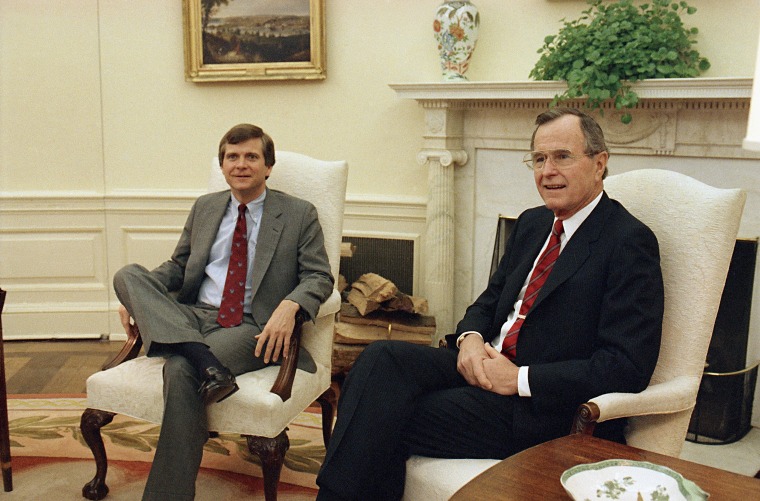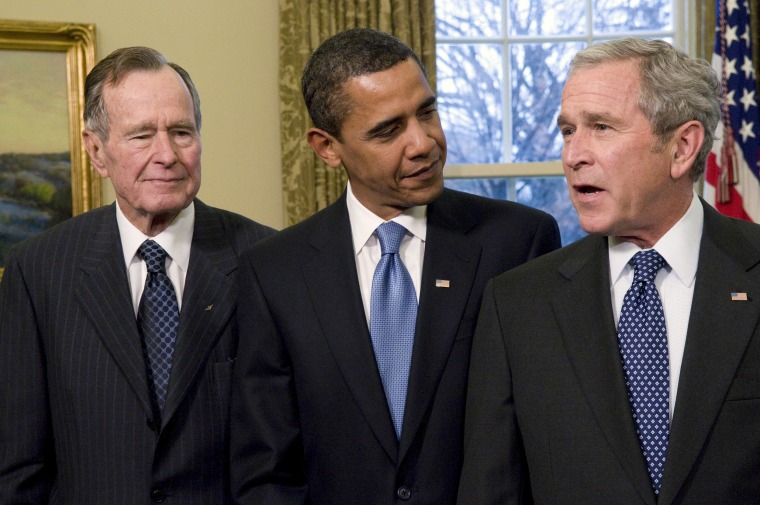Inside the National Cathedral in Washington and beyond it on Wednesday, George H.W. Bush was lauded as a courageous and decorous leader, “America’s last great soldier-statesman.” He was described as a loving father, a man with an appreciation for the zany parts of life and, as one columnist put it, the vanishing embodiment of a ruling class of trusted WASPs.
But amid the praise since Bush’s death, there have also been pointed critiques of his way of doing politics and winning the White House, which drew from a habit of relentless pragmatism, including on matters of race and questions of equity.
Bush employed a strategy of subtle stereotyping, playing on suspicion, fear and group-based guilt, political experts and historians say. The combination remains so potent that Democrats and Republicans have grappled for decades with Bush’s methods — and some have outright emulated them.
For some African Americans and Bush’s political opponents, the Bush legacy also demonstrates the way that pernicious allusions to race can influence elections and all the consequences for power and exclusion that follow.
Bush’s tough-on-crime stance in his 1988 presidential campaign, including in his speeches and an ad from an outside group about a black criminal named Willie Horton, has been cited by many historians of racial politics and even some Republicans as helping to drive decades of politics low on justice or equity.
For many Republicans, an overwhelmingly white group, the Bush presidency was good for black America.
It is where the current notion of school choice began to flourish, and Bush named Louis Sullivan, a black man who was dean of the historically black Morehouse University School of Medicine, to his Cabinet. As secretary of health and human services, Sullivan was a fierce tobacco opponent because, in part, of its disproportionate effect on black health.
“H.W. Bush is everywhere, in ways that defy easy binaries,” said Leah Wright Rigueur, an assistant professor of public policy at the Harvard Kennedy School of Government. “What’s much easier to do is say ‘this person is good,’ or ‘this person is bad,’ when reality is much more complex. What I have concluded is that Bush was a person who took a utilitarian approach to achieving power.”
During the 1988 Democratic presidential primaries, it was Rep. Al Gore, D-Tenn., who first raised the idea that his opponent and the eventual nominee, Massachusetts Gov. Michael Dukakis, was soft on crime. Gore accused Dukakis of being unwilling to contain violent criminals like Horton, a convicted murderer who had raped a white woman and stabbed and robbed her and her partner while out on a weekend furlough.
Lee Atwater, Bush’s campaign manager, heard the story and thought that Bush, the 1988 Republican presidential nominee, should raise the Horton case so often that voters would think of Horton as Dukakis’ virtual running mate, Atwater later said.
Bush delivered.
On the campaign trail, he frequently brought up Horton and the specter of uncontrolled violent crime. He made references that Atwater had intentionally crafted to sow fear of black Americans while not sounding overtly racist to white voters.
In letters and reports Atwater wrote, scattered across several public figures’ archives, Atwater made it clear that politicians in the 1980s could not actually use the N-word, but that they needed to deliver messages conveying racial danger and inferiority with the same clarity to win, said Wright Rigueur, who is working on a book about black men and women who worked with Republican presidents and resisted them in the 1980s. (Atwater admitted as much in interviews and conversations in the final years of his life when he worried that future generations would assume he was a racist. A terminally ill Atwater apologized for his campaign tactics.)

“The Horton issue worked for the Bush campaign precisely because most white voters at the time did not want to think of themselves as associated with anything racist,” Wright Rigueur said. Atwater knew that an overtly racist message would repel many of 1988 America's white voters. “But Horton did not register as racist, right away, to anyone but black people.”
The ad, produced by an outside group, ran for a short time on cable TV. In it, a disembodied male voice describes — in the tone often deployed by newscasters to draw attention to breaking news — Bush’s support for the death penalty, Dukakis’ opposition to it and what Horton, already a convicted murder, did while out of prison on furlough. Its images of a seemingly emotion-free Horton and words like “Kidnapping”, “Stabbing” and “Raping” occupy much of the ad. There are no explicit mentions of race.
“It wasn’t just a one-time use of a nasty ad for political expediency,” said Tali Mendelberg, a professor of politics at Princeton and director of the Program on Inequality at the university’s Mamdouha S. Bobst Center for Peace and Justice, who wrote a 2001 book, “The Race Card,” on the Horton ad.
“Bush himself repeatedly talked about Horton, an African-American prisoner, so much so that he made him a household name,” Mendelberg said.
Once in office, Bush the president was much like Bush the candidate: difficult to categorize.
He lauded volunteerism and what he regarded as decency. He criticized people with HIV and AIDS but signed bills passed by a Democratic-controlled Congress that created critical funding for their health care. Bush signed the Americans With Disabilities Act, which transformed much of America into a place more accessible for the disabled. He elevated Colin Powell, then a four-star general and a firm supporter of diversity and inclusion efforts but conservative on matters of war, as chairman of the Joint Chiefs of Staff.
Bush also nominated Clarence Thomas, a constant civil rights foe, to the Supreme Court seat held by Thurgood Marshall. Bush vetoed the 1990 Civil Rights Act and talked about the 1992 riots in Los Angeles in terms that suggested black Americans needed constant control, critics said.
“There are no perfect men among us,” said Armstrong Williams, a black Republican operative whose long career in GOP politics was shaped, in part, by Bush’s drive to compete with the Democratic Party for black votes. "If there ever were, they are either in heaven or dead. And I believe that George H.W. Bush was a really good man.”
Bush never backed away from the Horton ad, which Williams said he admires second only to Bush’s later, firm support for Thomas as multiple women raised sexual harassment allegations against him.
In the decades that followed Bush’s presidency, Republicans and Democrats alike focused domestic policy on fighting crime, driven by the shadow of Willie Horton.
President Bill Clinton supported and signed legislation that extended sentences for minor and serious crimes, which Williams said harmed “an entire generation of young black men and women.” Until the 2008 election, the policies and reasons behind the laws were rarely discussed outside of black America as racist and deeply damaging, Williams said.
By the time President Barack Obama began championing criminal justice reforms in the late 2000s, Republican and Democratic members of Congress feared that a vote for anything that looked like leniency could end their political careers. They could go down like Dukakis, facing a Willy Horton-type attack. The situation prompted the Obama administration to scale back the push.
In some ways, the reach and effectiveness of Atwater’s strategy in Bush’s hands has grown undeniable, even as it has evolved. The day after the 1988 presidential election, Atwater formed a political consulting firm with other operatives, including Paul Manafort.
It was known as a highly effective dirty-tricks shop, a group of consultants with a creative streak and a finger on the American pulse. It was also when Manafort first connected with Donald Trump, years before he became a presidential candidate whom researchers have repeatedly described as successful because he advanced overtly racist, sexist and xenophobic explanations for economic and social problems.
“I have seen many Republicans who came up in the Reagan and Bush era who say: ‘Oh my God. Trump’s party is not my party. Oh my god, Trump,’” Wright Rigueur said. “But Trump is a symptom of what has been going on for a long time. Trump is a byproduct of the idea that we can toe the line and subtly cross it, feed the beast and somehow not be connected to it."



